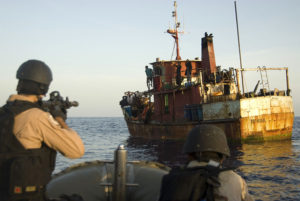Piracy Results from Environmental, Economic Pressures
Pirates hold a renowned position in the cultural conscious of the Western world. Blackbeard and other outlaws of the seas have captured the awe and imagination of writers and the public at large for centuries, including a number of recent films such as the Pirates of the Caribbean series. For most westerners, fictional and historical portrayals act as the only interaction they will have with pirate crews. Yet even in the present day, pirates continue to harass passengers of cruise ships and the crews of commercial vessels in a number of key commerce routes around the world.
The most famous of modern pirates originate in the Horn of Africa. Many in Somalia turn to piracy as a result of the destruction of their livelihoods. One report from All Africa notes that a number of Somali pirates started out as fishermen before foreign fishing vessels and pollution forced them to seek alternative sources of income. Regardless of their origin, the international community and international business interests cannot ignore their effect: the World Bank reports that Somali pirates cause $18 billion in economic damage each year. As a result, numerous international organizations work together to combat piracy in the area. The UN, for example, maintains a number of departments that work solely to encourage stability and fight piracy in Somalia, while the EU announced that it will continue to patrol the coast of Somalia through the end of 2018 in order to combat pirates. The number of attacks and raids has fallen in recent months, commercial and passenger vessels in the area are still at risk.
Further east, in the Strait of Malacca near Malaysia, Indonesia, and Singapore, pirates roam the second-busiest waterway in the world. In particular, this strait acts as the route for petroleum heading to China and other growing economies in East Asia, an amount equal to just over 17 percent of total world petroleum supply. The pirates often aim for ships carrying this petroleum. The Strait as a whole has surpassed the waters off the coast of Somalia as the area most affected by piracy in the world. If these pirates successfully hijack a ship, they sell the cargo aboard the ship before releasing the crew, a practice that differs from the ransoms that act as the main source of income for Somali pirates. Like the Somali pirates, those in the Strait turn to piracy due to a loss of their way of life caused by overfishing and pollution. Tensions with China in the South China Sea have complicated matters, and Southeast Asian nations have had difficulty defending the waters because of sovereignty disputes . As a result, shipowners in the area remain somewhat pessimistic about the short term future of commerce in the Strait, though the economic importance of the Strait will only continue to grow in the long term.
Piracy is not only prevalent in oceans. On the Amazon, the longest river in the world, pirates attack river boats and their passengers, stealing valuable items including jewelry and smartphones. The attacks span from the Brazilian rain forest, where growths in population and drug trade have led to increased piracy, to Peru, where there are recent news reports of a cruise ship being raided and the tourists robbed. Many seek fuel and drugs, which they can illicitly sell to other buyers. Like the other pirates mentioned above, many turned to piracy as a result of economic desperation – one captured pirate stated that he robbed passengers in order to have spending money for Christmas. Yet, pirates use especially brutal methods, including rape and dismemberment. Thus, the practice will only encourage other forms of organized crime in the region.
Economics remains a dominant factor in all of the above examples. Specifically, the economic desperation of poor villagers in each region leads them to turn to piracy in order to ensure their survival. This desperation comes from the devastation caused by illegal fishing and environmental destruction, which hindered the ability of fishermen to continue their way of life. Capture of Somali Pirate, May 2009, Wikimedia Commons carried out by the UN suggests that poor economic conditions act as the main impetus for piracy. Thus, creating other economic opportunities for these people and providing other forms of assistance could do far more than warships and marines to battle piracy and reduce the danger to sea and river commerce. If this recognition by the UN leads to action by the international community, then the international community could free commerce from the dangers posed by piracy.
